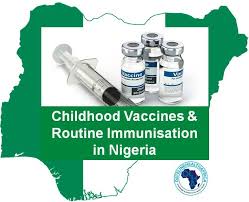The World Health Organisation on Sunday said Nigeria ranks first in the top 20 zero-dose countries’ list of 2022, with over 2.3 million estimated zero-dose children, about 16 per cent of the global total.
This is according to the 2023 results report showcasing the achievement of key public health milestones, even amid greater global humanitarian health needs driven by conflict, climate change, and disease outbreaks.
The report is released ahead of the 2024 77th World Health Assembly, which runs from May 27 to June 1, 2024.
Zero-dose children are defined as those who lack access to or are never reached by routine immunization services. They are operationally measured as those who did not receive their first dose of DTP, a vaccine containing diphtheria-tetanus-pertussis.
“The world is off track to reach most of the triple billion targets and the health-related Sustainable Development Goals,” said WHO Director-General, Dr. Tedros Ghebreyesus. “However, with concrete and concerted action to accelerate progress, we could still achieve a substantial subset of them. Our goal is to invest even more resources where they matter most—at the country level—while ensuring sustainable and flexible financing to support our mission.”
The report said, “Nigeria ranks first in the top 20 zero-dose countries list of 2022, with over 2.3 million estimated zero-dose children, about 16 per cent of the global total.
“The country also has the largest number of zero-dose children impacted by conflict. The Government of Nigeria has, rightly, prioritised reaching communities with a high burden of zero-dose children in its National Strategy for Immunisation and Primary Health Care System Strengthening.
“The goal is to reduce the number of affected children by at least 80% by the end of 2028.”
In 2023, the WHO Regional Office for Africa noted that the top 10 countries with the highest number of zero-dose children are Nigeria, Ethiopia, the Democratic Republic of the Congo, Angola, the United Republic of Tanzania, Madagascar, Mozambique, Mali, Chad, and Cameroon.
The regional office said the 10 countries account for 80.3 per cent of the cumulative number of zero-dose children from 2019 to 2022.
“Recognising that health-related complexities associated with zero-dose communities require cross-sectoral collaboration and strong partnerships, starting in 2020, the Ministry of Health, with support from WHO, used the multilateral collaboration platform, the Global Action Plan for Healthy Lives and Well-being for All to ensure a robust implementation of the NSIPSS, and specifically, to help identify and reach zero-dose communities with immunisation services through the PHC system.
“This aligns with Output 4.2.1 of the 2022-2023 WHO Programme Budget.”
It added that between March 2021 and January 2023, over six million children have benefitted from access to life-saving immunisation services, with more than five million children receiving the third dose of the pentavalent vaccine (Penta3) annually.
“High-quality and fit-for-purpose data is essential to identify communities targeted for health interventions. In 2020, Nigeria’s National Primary Health Care Development Agency created a data system to locate zero-dose communities, with support from WHO and the United Nations Children’s Fund.
“Immunisation records, health facilities, surveys, local community data at the sub-national level, and other data sources were consolidated.
“Stakeholder workshops and meetings were organised to analyse the data, which indicated that targeting 100 local government areas in 18 states would reach 1.5 million zero-dose children out of the 2.3 million nationally and, improve immunisation coverage. The detailed analysis informed revisions to the zero-dose priority actions within the NSIPSS,” it said.
It added that expanding childhood vaccination coverage in Nigeria will require a substantial and sustained commitment to reach every zero-dose child and missed community.


